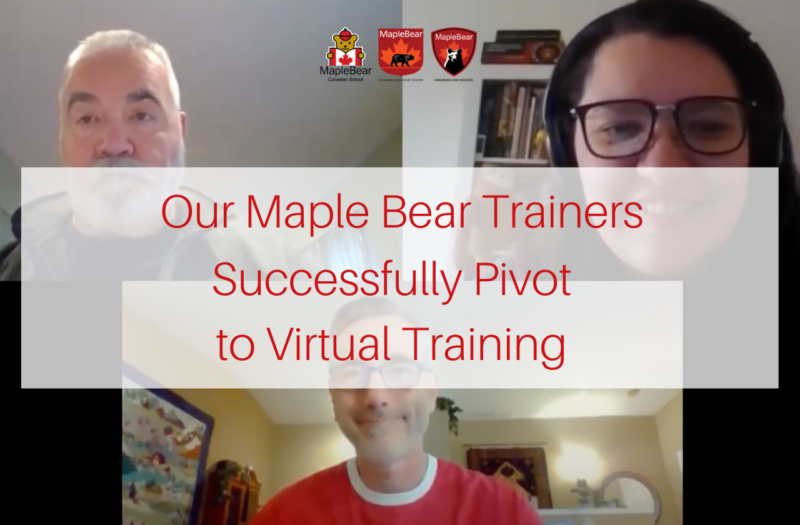
Motivating Students to Study During COVID: A Q&A Review
Maple Bear Global Schools’ Co-Associate Academic Directors for Maple Bear Brazil, recently held a series of online tutorials with our amazing parents in Brazil to share some academic strategies for the new world of online education. The topics covered to-date include routines as a way to reduce stress at home, playing and learning with your children and supporting English language skills at home.
The replays of these tutorials are available on our Youtube Channel at the links below:
Supporting English Language Skills at Home
Playing and Learning with Your Children
Family Routines
During these sessions, there were a number of questions which arose from the parents participating, and while questions related to the topic discussed each week were answered immediately and sent out, the following list of questions answered below are questions which were not directly related to the tutorial themes.
Check out our latest blogpost for simple, actionable advice from our Maple Bear Faculty on how to support your children’s learning at home.
More sessions are planned over the next few months, so be sure to stay tuned for details.
Questions and Answers About Motivating Kids to Study During COVID
Q: Do you have any tips for children who are unmotivated and refuse to do their homework? How to stimulate them?
Q: If a child shows any stress or resistance in carrying out school activities, how much should I insist? Or should I respect her will?
Q: I made a chart of routines, but it is not working here. What should I do?
Answers:
If children resist or refuse to do their school work, try to discover the reason(s).
- They may find it too easy, repetitive and boring because they have already mastered the skill. In that case, communicate with the teacher, requesting the next level of work or some engaging enrichment challenges.
- They may find it too difficult, an especially common problem due to the lack of direct collaboration with teachers and classmates. In that case, conference with the teacher to request one-on-one re-teaching. Even a few minutes of individual step-by-step support can be very helpful.
- They may be fatigued or stressed by virtual learning. It is not the same as their Maple Bear classroom experience. There is no easy solution other than strong support during the child’s virtual classes. Be there, listen to the lesson and be ready to work with your child on the assignments. Let the teacher know of the situation.
You are not the teacher, but you are the adult. That means you need to set boundaries for your child’s behaviour. Be understanding and supportive, empathize — but don’t give up on your expectations. It is reasonable for you to insist that your Elementary, Middle and High School years’ children spend time on learning!
The secret is in avoiding power struggles. Some strategies:
- Help them understand the importance of education, speaking calmly and at their developmental level about “why we have to do this…”, without dire threats.
- Try the “first this, then that” strategy: “First you complete your school work (well) and then you can … (something they prefer to do).” or “first, work hard independently for 15 minutes, then have a movement break/snack break/phone break for 5 minutes, then another 15 minutes of school work with my support”.
- Suggest that your child schedule a virtual shared work session with a classmate. Collaboration is not “cheating”, but shared learning.
- Prepare for transitions to school work ahead of time. Point out the schedule and use positive language: “In 5 minutes it’s time for homework, then we are all going outside for a bike ride.” Use a visual schedule with check marks.
- Wait time. If your child is uncooperative, no matter how illogical or impulsive they are acting, acknowledge what they are thinking, doing and feeling. Do NOT ask questions like “Why are you being so stubborn?” (they are not going to give you a logical answer!) Instead, acknowledge it. “Ahhh…You don’t want to do your school work. I see.” Then, wait. This is where you pause for a good 3-7 seconds (or longer) while your child has a chance to process. This is wait time…teachers use it all the time! You stick with your boundary but calmly. Don’t use threats. Don’t punish. Teach. “We all need to get a good education. Let’s get started on the homework together. Which assignment do you want to do first?”
- Choices. This is a super tactic: Give your child two choices (both of which work for you). For example, “It’s almost time for homework. Would you like to sit at the kitchen table or at your desk?” or “Do you want to do it by yourself, or would you like to work with your classmate?” Notice that this does not involve bribery such as “do this and I will give you ice cream”. Bribery with rewards teaches the wrong lesson. Notice that it doesn’t involve force: grabbing the child and dragging him to his desk is not teaching the right lesson either.
Children like to have autonomy, but we adults must set the safe limits!
Q: My son refuses to speak English at home. How can I stimulate him in the language during games if he doesn’t even accept that I speak to him in English?
Answers:
Patience is the key here. Many children want to be perfect when they speak, so are hesitant to try their English. It could also be stress-related, a message to you about his emotional state such as anger at the many new restrictions. Just keep talking to your child in English and allow him/her time to come around. If you are kind and patient, but persistent in speaking English your child will eventually respond to you. Try including your spouse and any other children in your conversations. Set a good example. Try using humour or a game-like challenge. In addition, watch shows or movies in English and then discuss them in English. Even if your child doesn’t join in, at least he/she is hearing English. Exposure to English is a major benefit.
Don’t turn this into a battle. Your children are refusing to speak and you cannot force them. They may be unmotivated because the conditions at home are so different from the conditions at school. At school, they are motivated by need (everyone — teachers and kids are speaking only English), comfort (all my classmates are speaking English the way I do: we are in this together, no embarrassment) and desire to participate in the fun (excellent active learning which involves challenge and collaboration). You cannot replicate a Maple Bear school classroom.
Some ideas:
- Talk to your child (not a long lecture, just a friendly chat) about why you sent her to Maple Bear, the benefits for her brain in learning a second language, what other advantages come in knowing English, how it will improve her future, etc. Emphasize how proud you are of her progress, and how you want it to continue. Children always want to know “Why do I have to do this?” and deserve a good answer.
- Try the English challenges we mentioned in the tutorial, as they involve classmates who also need to practice their English. It is more fun and more effective to use English in a real-life context.
- Keep speaking English. Model it, even if your child does not respond in English.
- Watch movies in English, with the compromise being Portuguese subtitles.
- Make sure you talk to your child’s teacher about this problem. She will have some suggestions. When doing virtual classes, she can focus on oral English. As well, she may be able to assign speaking tasks as homework, putting the responsibility on your child instead of on you.
- Talk to your child about his feelings and frustrations, acknowledging them, and offering support and positive suggestions about dealing with stress.
Q: My son is in JK, still learning letters and numbers. How do I help him take an interest in knowledge? At school, children challenge each other. At home, we are left with figures (letters) and beans (number).
Answer:
Young children learn from others while socializing. This is why play is such an important part of the learning process. Play is essential, not a waste of time. Play with your child. Incorporate letters and numbers in the games you play together. Check the Maple Bear Digital Learning Community site for numerous activity ideas. Your child’s teacher, Pinterest and other parents are also great sources. Children are naturally motivated by play, and not by the abstract concept of “knowledge”. Focus on playing, reading and chatting with your child. Check out the tutorial on play.
Q: Is there a specific teaching method for children with dyslexia who have a hard time focusing?
Answer:
Dyslexic students have a learning difference. Their brain can’t hold information as efficiently as non-dyslexics, making their learning a different process. It is important to talk to the teacher and have a strategy for supporting the special needs of the child. Schools are receiving comprehensive special needs training and will have some suggestions. For example, we know that multi-sensory activities that involve using senses like touch and movement alongside sight and hearing help dyslexic children absorb and process information. Examples of multi-sensory activities include:
- Writing words and sentences with tactile materials – e.g. glitter glue, sand, pasta, LEGO, or beads.
- Physical activities to practice spelling, e.g. hopscotch or jump-rope – the children spell out words when they jump to each square or over the rope.
- Work in pairs (you and your child) and take turns to dictate words and spell them.
- Scavenger hunts for letters and words – give your child a word. Next, write letters onto notes and hide them around the home. Challenge your child to find the letters to construct the assigned word and then glue them together on a poster.
- There are many websites that offer useful suggestions for fun and effective learning activities for children with dyslexia.




